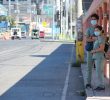CAGAYAN DE ORO CITY, Philippines – A Catholic multi-level school here is set to start the academic year (AY) through non-traditional arrangements for its students. This is to keep up with the “new normal” resulting from the Coronavirus Disease (COVID-19) pandemic.
The Jesuit-run Xavier University-Ateneo de Cagayan (XU) said it will open its grade school, junior and senior high school and college (except for graduate school, law, and medicine) campuses in July.
All its undergraduate schools will follow a quarterly schedule, with a college semester composed of two quarters. The first semester is divided into two quarters: July to mid-September and mid-September to November, and December to February and March to mid-May.
XU will be adopting the “flexible learning arrangements” consisting of two components designed to adjust the public health crisis, said its president Fr. Roberto Yap.
“We plan to begin SY 2020-2021 in July 2020 following Home-Based Learning and then shift to Cautious Return to On-Campus Learning when the Government will allow the return of physical classes on campus,” Yap said on his May 7 memorandum to the XU community.
Home-based learning will consist of portable learning packets (hard and soft copies), online learning (synchronous and asynchronous), and online student support.
However, courses that cannot be delivered by home-based learning according to XU standards will be postponed to a later time.
Yap said the cautious return to on-campus learning will strictly enforce the observance of physical distancing, a limited number of students in a classroom, safety, and sanitary precautions, and limited large gatherings.
The flexible learning, he said, is a combination of those components to ensure that minimum standards of the Commission on Higher Education and the Department of Education are met.
XU will implement these new learning arrangements with the following aspects in mind, namely, outcomes-based and performance task assessment, self-directed learning, regular consultation with the teacher, peer-to-peer learning, guidance and counseling services, student support services, Ignatian formation, reduced student loads, smaller class sizes, staggered schedules, and several shifts.
For the graduate school and professional schools of law and medicine, the academic year will start in August and will end in May the following year.
No tuition fee increase
“Although the tuition fee increase has already been approved, there will be no tuition increase for SY 2020-2021 and some miscellaneous fees will be reduced in view of flexible learning,” Yap assured.
The school is also planning to increase its scholarship and financial aid programs to help parents cope with the present crisis. Each school will release an updated assessment of tuition and fees, modes of payments, and payment installment options before enrolment.
From the month of May to June 2020 and in the course of the school year, Yap said XU’s teaching faculty will be undergoing systematic and intensive training so they can facilitate quality flexible learning, especially home-based learning.
“XU is also strengthening IT support and improving access to the internet and gadgets for faculty and students. Those who have insufficient access to the internet and gadgets will be provided hard copies of the portable learning packets,” he said.
The school also noted the active engagement of parents and guardians for the home-based learning to be successful, especially on grade-schoolers,
To prepare for the cautious return to on-campus learning, XU will be making the necessary and critical infrastructure adjustments to ensure all four of the school’s campuses — Divisoria, Pueblo, Macasandig, and Manresa — remain safe for everyone.
“Under flexible learning, co-curricular and extra-curricular activities will unavoidably be very limited. But under these unusual arrangements, we will do our best that flexible learning is marked by the characteristics of Jesuit education,” Yap promised. (davaotoday.com)










